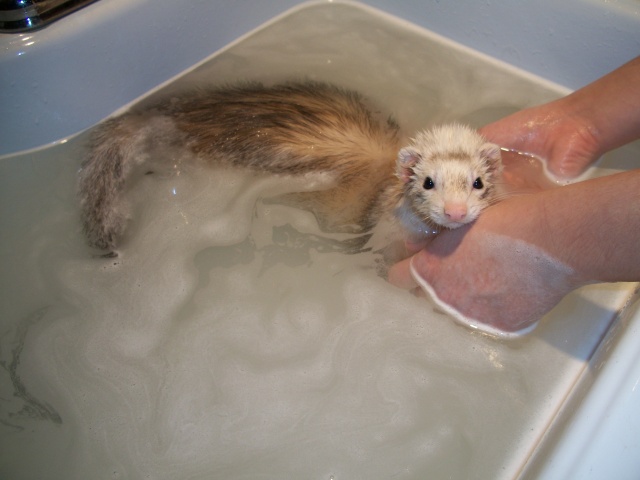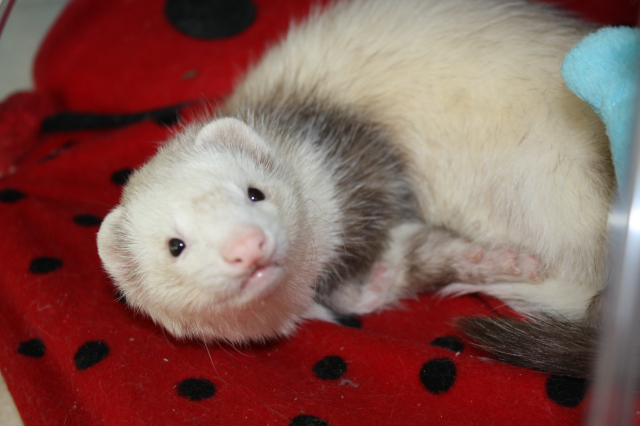Question
 Booger
Booger
Hi,
I rescued an older ferret named Booger this time last year from my neighbors. They said that they got her from the pet store on sale, sick and dying (hence her name Booger :) ). They nursed her back to health and swear that she had always looked sickly since (thin hair, etc). I am unsure of how old she, but I think she is at least 5 or 6. She has a ton of spunk and energy, even compared to my 1 and 3 year old. But she looks awful and very rat like. Her hair is thinning badly all over, she seems dehydrated, her urine is a dark yellowish almost brown color, she has always felt like she has a fever, her nails are very thick, and she is very oily and smelly. But she eats and drinks a lot, the same as the other two so I don't know why she is dehydrated. I wont have the money to take her to the vet for another few weeks but I am assuming that she has adrenal disease. I don't think surgery is an option at her age, and I just want some opinions on how I can make the rest of her life as comfortable and happy as possible. And as hard as it is to think about, how do you know when it is time to get a ferret in her condition put to sleep? When she's at her end, I don't want her to suffer.
Also, she occasionally has these circular dark red spots, sometimes the size of a dime appear on her back thighs. Almost always in the same exact place. However, they completely disappear in a day or two. They don't seem to hurt her, but they are getting larger and more frequent. I can't seem to find any information about what it might be.
thank you for your time,
Jessica
AnswerHello Jessica!
Poor Booger. It seems like she has gone through a lot. Since she has been sickly most of her life, it is possible that what you are seeing is a progressive condition. Older pets are less likely to combat disease as well as in the past. OR, it could be that her sickly nature weakened her immune system and put a toll on the rest of her body, and what you are seeing now is the result of many years of stress to her system.
Adrenal disease (hyperadrenocorticism) DOES cause hair loss in ferrets. However, not ALL ferrets who suffer from adrenal tumors loose their fur! It depends on the ferret, the type of tumor and the location. It is also not the only symptom. Often lethargy, a "pot-belly" appearance, weight loss, muscle wasting (atrophy), and "orange"-looking skin or a poor coat are also seen. Females sometimes develop an enlarged vulva, while males can show signs of aggression and difficulty urinating. Did her hair loss start on her back/tail and progress toward her shoulders? This is the classic pattern of adrenal disease in ferrets.
Does Booger seem to be drinking more than your other ferrets? Dehydration is certainly a concern, ESPECIALLY in an animal that drinks more than it normally does. Diseases such as kidney failure, adrenal disease and other metabolic conditions such as diabetes (Insulinoma is more commonly seen in ferrets) all can cause an increase in thirst.
Why is Booger so thirsty if she drinks so much? No matter what condition is causing the thirst, the result is the same... increased water intake and increased urine output. An animal that has kidney failure, for example is excreting most of the water it drinks before it can be absorbed. This causes dehydration in the body, and the brain sparks the signal that causes the animal to want to drink more and replenish a water supply that continues to dwindle. This is why conditons such as diabetes in humans causes them to want to drink gallons upon gallons of water, yet be unable to ever quench their thirst. Ferrets with adrenal disease drink more as well. This is because excess steroids are released into the system, which causes an increase in thirst. The result is the same despite the cause, and dehydration can become serious quickly in these cases.
Dehydration is DANGEROUS. If more than 12% of the normal water content of the body is lost, the result can be fatal. It would be wise to monitor Booger for signs of dehydration. Gently pull the skin on the scruff of her neck so it forms a "tent". Does the skin slip easily back into place? If not, she is dehydrated enough to need medical attention and likely IV or subcutaneous fluids for re-hydration. Also, check her gums (compare them to a healthy ferret if possible). They should be a healthy pink color. If they are muddy, pale or white, she needs to be seen by your vet ASAP.
The color of her urine concerns me. I would run some blood work and a urine analysis to determine exactly which of her body functions are compromised. Dark urine is NOT normal.
Most of her signs point to adrenal disease, but I cannot diagnose her problem. You need to make an appointment with your vet and have her evaluated as soon as possible. In the meantime, monitor her water consumption and keep a close eye on her. You might want to consider taking her temperature. The normal range is about 101-103 degrees Fahrenheit. If it is higher than 104, bring her to your vet IMMEDIATELY. High temperatures are extremely dangerous since they inhibit vital enzyme activity in the body. Low temperatures work in a similar way. If her temperature is extremely high or low, she needs medical attention. Bring the body back to a normal temperature is tricky, and she needs to be watched VERY closely during the process.
If Booger is diagnosed with adrenal disease, you have a few options. Surgery may or may not be one of them, depending on her age, condition and opinion of your vet. Surgery will remove the affected gland(s), but even this has limited success. Statistically, 85-90% of the ferrets with the disease have a tumor ONLY in the left gland. and 75% are female. The right gland is often attached to the vena cava, the largest vein in the ferret's body, and removal can be difficult and dangerous. The disease can affect both glands as well. If both need removal, the result is the loss of necessary hormones. Some ferrets deal with this better than others, and often a condition called Addison's Disease is the result. It needs to be managed with chronic steroid injections. Also, removal of one gland can mean the disease will spread to the other several months to years later. There is no guarantee surgery will cure the disease. In some cases it does, but in others it causes complications.
Chromic steroid injections of a drug called Lupron is another method to control adrenal disease. If diagnosed, you should ask your vet if this is a good option for Booger. Remember, Adrenal disease is a progressive condition. Lupron or any other medication will NOT cure it, only mask the symptoms.
Pet owners know when it is time to let their friend go. When there is no quality of life, and it is clear the pet is suffering it is time. If you are still uncertain, it is best to bring the pet to the vet for a second opinion. Often an outside source can offer good advice.
Further information:
http://www.ferretcentral.org/faq/med/adrenal.html
http://www.miamiferret.org/basics.htm
I hope this answers your questions. Please make an appointment with your vet ASAP. I hope Booger is not suffering from adrenal, although she does show multiple symptoms. Even though she is eating and active, bring her in for a checkup right away. It is MUCH better to diagnose a disease early. There is a much better chance it might be cured or stopped before it becomes worse.
Let me know if you have any other questions. You know where to find me.
-Cindy P.


 Elderly ferret
Question
Booger
Hi,
I rescued an older ferret named Bo
Elderly ferret
Question
Booger
Hi,
I rescued an older ferret named Bo
 Just some basic help questions
Question
Benny!
Hi!
My ferret Benito (we just call him
Just some basic help questions
Question
Benny!
Hi!
My ferret Benito (we just call him
 Shes so nippy
Question
Delilah
My boyfriend got me the cutest
Shes so nippy
Question
Delilah
My boyfriend got me the cutest
 Choosing A Second Ferret.....Vaccine Information
Question
Sirius Black
My lil guy Sirius is one y
Choosing A Second Ferret.....Vaccine Information
Question
Sirius Black
My lil guy Sirius is one y
 How do you think Isis is?
QuestionCookie and Isis :)
QUESTION: Hello. :)
How do you think Isis is?
QuestionCookie and Isis :)
QUESTION: Hello. :)